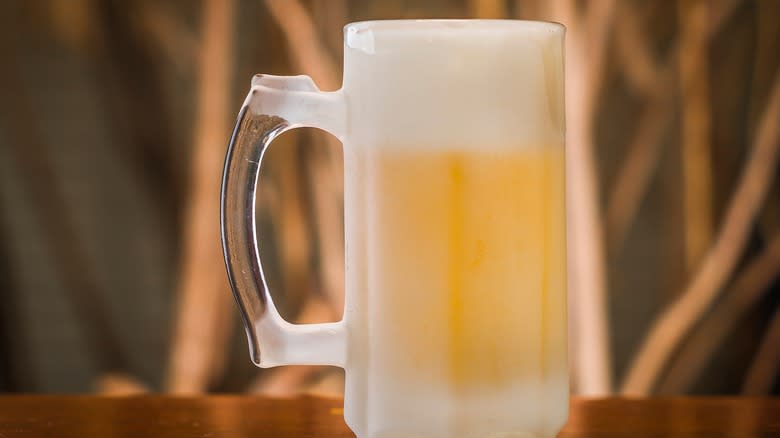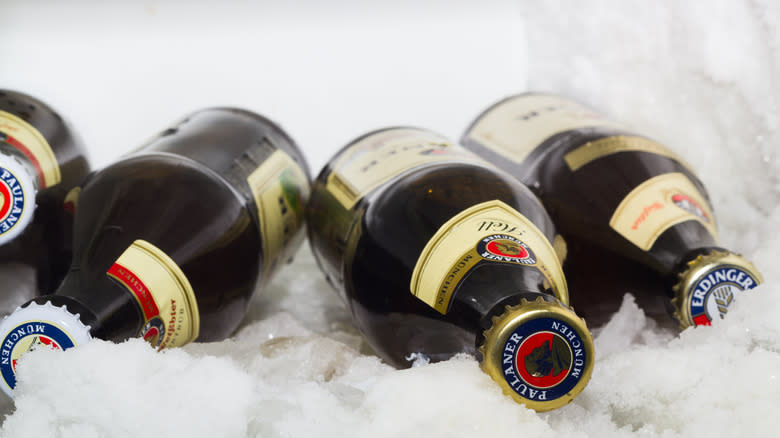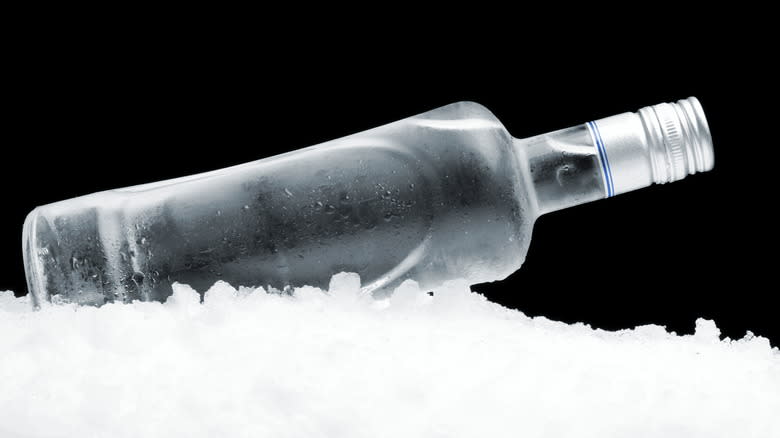What Temperature Does Beer Usually Freeze At?

Unfortunately, many beer enthusiasts have found out the hard way that their favorite malt beverage does, in fact, freeze. Anyone who's stashed a few bottles in the freezer to quickly cool them down — only to forget about them until the next day — knows that beer will freeze completely solid. But maybe you've also cracked a can outside in freezing temperatures and noticed that it retained its liquid form. So what temperature really causes this liquid to freeze? Turns out, it's all dependent on the alcohol percentage.
Pure ethanol (another name for the type of alcohol found in all our boozy drinks) has a freezing point of around -173 F while water has a freezing point of 32 F. Beers contain a mixture of both alcohol and water, and their freezing point is determined by the ratio between the two. Beverages with lower alcohol percentages — like beer — freeze at higher temperatures than spirits like whiskey and vodka. Most beers freeze at around 28 F, meaning they can be safely stored in a home refrigerator, but should be kept away from the freezer.
Read more: 10 Of The Healthiest Beers You Can Drink
It's All About ABV

Generally, most beers fall between 4% and 6% alcohol by volume (ABV), but double IPAs and craft batches may reach well over 10% ABV. As the alcohol percentage increases, the freezing point lowers. While a standard beer will freeze at 28 F, a double-digit ABV brew will freeze at a significantly lower mark. According to CERN, a mixture of ethanol and water will freeze at 21.2 F when the ethanol concentration reaches 10%. This temperature assumes the beer only contains an ethanol and water mixture. In reality, the sugars and additives in the beer will likely alter this freezing temperature slightly, but the difference will be insignificant.
Luckily, most home fridges hum along below 40 F but above freezing. So, refrigerated beer tastes refreshingly cold without freezing. Transfer those bottles and cans over to the freezer, however, and the story changes. Home freezers usually stay well below freezing — usually right at 0 F. This is significantly under the freezing point of even high AVB beers and will quickly freeze the liquid in cans and bottles. Plus, as it freezes, water expands. This expansion is more than enough to pop tabs and crack glass bottles, leading to a slushy mess of beer in the freezer. Even if the bottle or can doesn't explode, you still probably don't want to drink beer after it thaws. The thawing process oxidizes the brew, which will make it taste strong and stale.
Other Types Of Alcohol

While you may have accidentally exploded a few beers in your freezer, you've probably also noticed that bottles of vodka never seem to freeze. These liquors do freeze eventually, just at super low temperatures. Most distilled spirits, a distinction that includes hard alcohols like vodka, whiskey, tequila, and rum — are bottled at 80 proof, a number that is double the ABV. So, a bottle of 80-proof vodka will contain 40% alcohol by volume. According to CERN's freezing point chart, mixtures with 40% ethanol will freeze at -13.9 F. Stronger 100-proof liquors won't freeze until exposed to -28.3 F.
Generally, home freezers aren't able to drop to such low temperatures, so your bottles of liquor can be safely stored in the freezer. However, another common class of spirits might not be as safe: liqueurs. Containing sugars and additives, liqueurs -- from Campari to Kahlua — usually have a much lower proof. These cocktail essentials are generally between 30-proof and 60-proof, which is a low enough alcohol percentage for the bottles to freeze in a standard home freezer.
Read the original article on Daily Meal.

 Yahoo Finance
Yahoo Finance 